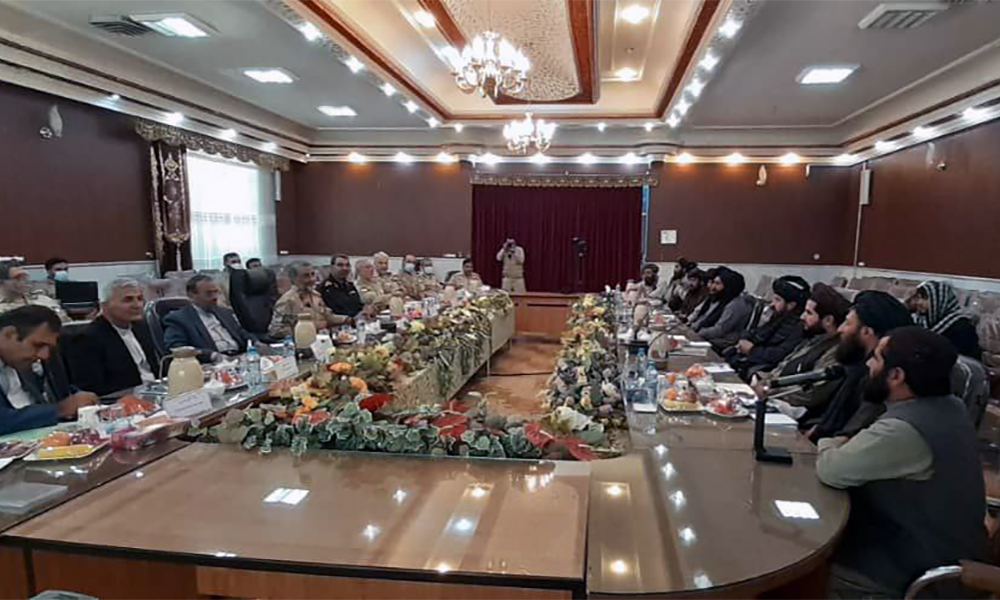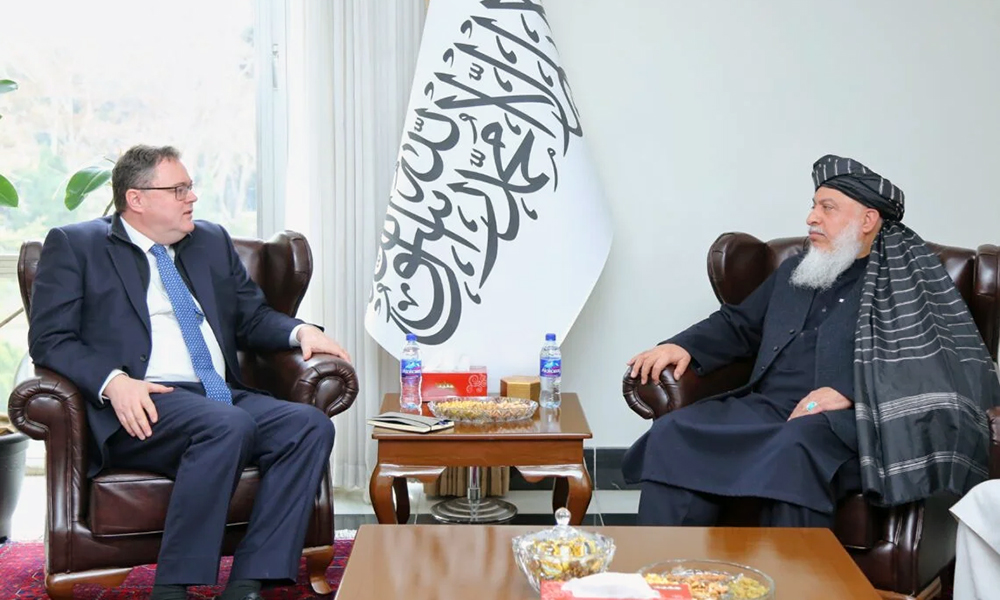Latest News
IEA and Iran security officials meet to resolve border tensions

The Ministry of Defense of the Islamic Emirate of Afghanistan (IEA) says that a delegation from the Ministry of Defense and Iranian officials met this week to discuss border tensions between the two countries.
According to the ministry, based on previous agreements between the Afghan and Iranian delegations, the two sides met Friday in the Iranian city of Taybad to address "disputes over the Dugharun border in Herat and other border points between the two countries."
According to the Ministry of Defense: "The two sides discussed differences and [ways to] prevent the recurrence of border tensions, and reached an agreement.”
The agreement includes appointing certain individuals to the two countries’ border battalions, improving communication and coordination between border battalions, preventing tension and resolving problems through negotiations, and holding three more meetings.
The two sides also discussed border security, human trafficking and narcotics.
The meeting was chaired by Shabir Ahmad Osmani, Chief of Staff of the Afghan Armed Forces, and Qasem Rezaei, Iran’s Deputy Chief of Staff of the Iranian forces.
“It is very important that the relations between the two countries be cordial and good, and that circles that are opportunistic and want to create tension and create problems between the two countries do not have the opportunity. That is why the Islamic Emirate wants all border problems to be resolved through dialogue,” said Bilal Karimi, IEA deputy spokesman.
But some Afghan analysts believe that Iran, like other countries, is concerned about security threats from Afghanistan and is trying to prevent military movements along its borders.
"After the Taliban (IEA) came to power, neighboring countries, including Iran, saw the situation in Afghanistan as highly concerning, and the slightest movement on the country's borders caused concern among these countries. This has led Iranian officials to share their concerns with Taliban officials," said Lal Mohammad Lami, an international affairs analyst.
Latest News
Human traffickers should be sentenced to 1 to 3 years in prison: IEA leader

The Leader of the Islamic Emirate has issued a decree instructing the Ministry of Interior Affairs to prevent human trafficking and to arrest and refer culprits to military courts.
The decree containing six articles says that that military courts should sentence human traffickers to one year in prison for the first time, two years if repeated for the second time and three years if repeated for the third time.
The ministries of Hajj, information, telecommunications, borders, propagation of virtue, as well as religious scholars are asked to inform the public about the dangers and adverse consequences of travelling through smuggling routes.
The decree comes as the rate of migration has increased following the political change in Afghanistan in 2021.
Latest News
Eight Afghan migrants die as boat capsizes off Greek island

Eight Afghan migrants died after a speedboat carrying migrants capsized off Greece's eastern island of Rhodes on Friday, the Associated Press reported.
Greek authorities said that the capsizing was the result of the boat’s maneuvering to evade a patrol vessel.
A total of 18 migrants — 12 men, three women and three minors — all Afghan nationals, were rescued, Greece's coast guard said Saturday. The dead were also from Afghanistan, it said.
Some migrants remained hospitalized, with one in critical condition, authorities said.
Two Turkish citizens, ages 23 and 19, were arrested as the suspected traffickers. The boat sank after capsizing, the coast guard said.
The sinking off Rhodes was the second deadly incident involving migrants in the past week.
Seven migrants were killed and dozens were believed missing after a boat partially sank south of the island of Crete over the weekend — one of four rescue operations during which more than 200 migrants were rescued.
Latest News
Norwegian Chargé d’Affaires meets with IEA deputy foreign minister
Welcoming the diplomat’s visit to Kabul, Stanikzai underscored the importance of political relations between Afghanistan and Norway, the foreign ministry said in a statement.

The Norwegian Chargé d’Affaires for Afghanistan, Per Albert Ilsaas, on Saturday met with IEA’s Deputy Foreign Minister for Political Affairs, Sher Muhammad Abbas Stanikzai, in Kabul.
Welcoming the diplomat’s visit to Kabul, Stanikzai underscored the importance of political relations between Afghanistan and Norway, the foreign ministry said in a statement.
In addition to focusing on bilateral political, humanitarian, and other pertinent issues, the two sides expressed hope that continued engagement would lead to constructive solutions to related issues.
This comes two weeks after the Foreign Ministry Spokesman Abdul Qahar Balkhi expressed disappointment regarding the decision by the Norwegian government to downgrade diplomatic relations with Afghanistan.
Balkhi said in a post on X that such decisions should not be linked with internal affairs of other countries.
“Diplomatic engagement is most effective when it fosters mutual understanding and respect, even amidst differing viewpoints,” he stated.
“Access to consular services is a fundamental right of all nationals. We strongly urge all parties to prioritize this principle in the spirit of international cooperation,” he added.
-

 Sport5 days ago
Sport5 days agoZimbabwe’s opening ODI against Afghanistan abandoned
-

 World4 days ago
World4 days agoNorth Korean troops suffer 100 deaths, struggling in drone warfare, South Korea says
-

 Latest News2 days ago
Latest News2 days agoAfghan men must stand with women to support viable future of country: US envoy
-

 Latest News4 days ago
Latest News4 days agoTwo horror accidents on Kabul-Kandahar highway leave 52 dead
-

 Sport3 days ago
Sport3 days agoAfghanistan crush Zimbabwe by 232 runs in second ODI
-

 Regional5 days ago
Regional5 days agoIran’s president to make rare visit to Egypt for D-8 summit
-

 International Sports5 days ago
International Sports5 days agoLanka T10: Kandy Bolts in at 4th spot in playoffs after thrilling day
-

 World5 days ago
World5 days agoNATO takes over coordination of military aid to Kyiv from US, source says
























